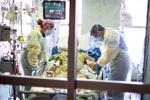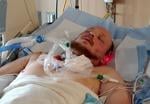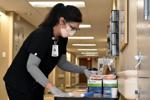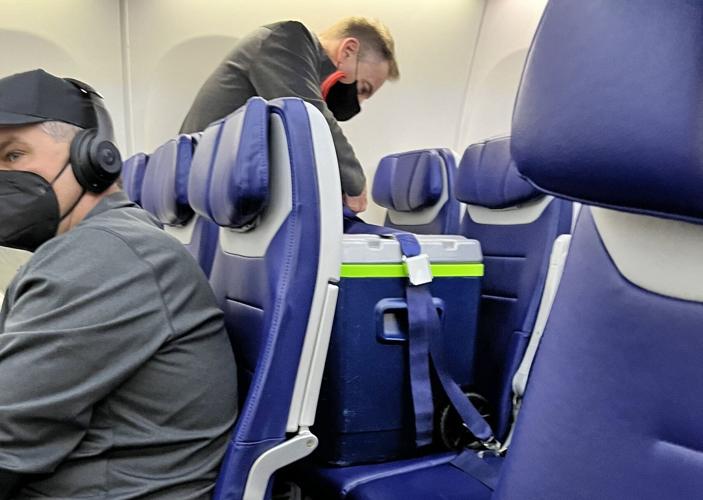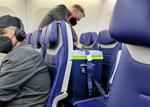
A Southwest Airlines employee (right) attaches a seatbelt to a cooler containing lungs to be transplanted, on Friday, Jan. 28, 2022. After a winter storm prevented a Mid-America Transplant flight from getting out of Chicago, the transplant team bought a ticket for the lungs on Southwest Airlines which ferried the precious cargo to Ëú╠Ď╩ËĂÁ in time for a transplant operation at Barnes-Jewish Hospital.
ST. LOUIS ÔÇö A recent early morning Southwest Airlines flight from Chicago to Ëú╠Ď╩ËĂÁ had some highly unusual and precious cargo. Boarding the plane at the last minute: a cooler containing a pair of lungs.
A three-member transplant team had left Ëú╠Ď╩ËĂÁ in a small Mid-America Transplant plane just after midnight on Friday, Jan. 28. At the time, it appeared they could easily get the life-saving gift of donated lungs in Chicago and return before a threatening snowstorm hit.
Dr. , a surgeon from Barnes-Jewish Hospital, procured the lungs around 4:30 a.m., which started the clock ticking. Blood flow must be restored to the organs within six to eight hours before they start to become damaged.
All appeared well right up until the team was about to climb back aboard the plane, which had been waiting to return them to Ëú╠Ď╩ËĂÁ. The snow grew heavier, and a dangerous freezing fog had formed.
People are also reading…
The plane could not take off, and they were unsure when conditions would be safe again.
Dr. , in her sixth year of an eight-year combined clinical and research residency at Barnes-Jewish Hospital, found herself staring at the big commercial planes at Midway International Airport next to their small charter airstrip.

Dr. Katharine Caldwell
ÔÇťI am by nature a problem-solver,ÔÇŁ said Caldwell, 31. ÔÇťSomeone tells me something canÔÇÖt be done, IÔÇÖm like: OK, what is the workaround? Are the big planes flying? Is that something we can do?ÔÇŁ
They pulled out their phones and started looking up flights. Those helping them back in Ëú╠Ď╩ËĂÁ joined in the search too. The only option they could find that would get them back in time was a direct Southwest flight leaving at 6:20 a.m.
With less than an hour before the flight, they could not purchase tickets online. They decided to head to the ticket counter. Pasque stayed with the plane and let Caldwell and the transplant coordinator, Alex Benton, make a go for it.
In their medical scrubs and pulling a cooler on wheels marked ÔÇťHuman organ for transplant,ÔÇŁ Caldwell and Benton marched past the line and up to the desk.
ÔÇťI just told them, ÔÇśI am a doctor. This is a set of human lungs ÔÇö an organ for transplant ÔÇö and you have a flight that leaves at 6:20 a.m., and I need to be on it,ÔÇÖÔÇŁ Caldwell said.
The employee simply said, ÔÇťOK,ÔÇŁ and Caldwell and Benton bought their tickets. That was around 5:50 a.m.
The security lane was not long, but they had to explain to the agents who they were and what was in the cooler. Not ever having faced this situation, the agents called their supervisors to look over their paperwork and credentials. They hand-checked the cooler instead of sending it through the X-ray machine.
Caldwell and Benton got through security shortly after 6 a.m. With just about five minutes until the gate would close, they ran the whole way, which their clog-like operating room shoes were not cut out for. Their gate was at the end of the terminal.
ÔÇťWe got lots of stares,ÔÇŁ Caldwell said.
They arrived as the doors to the plane were shutting. The employees at the gate stopped them with the cooler, unsure how to safely send it in the air. It had to stay with the transplant crew, but it was too large to be a carry-on.
ÔÇťCan you talk to the pilot to see if thereÔÇÖs any way around this?ÔÇŁ Caldwell asked. ÔÇťWhat can we do?ÔÇŁ
Benton, meanwhile, was calling to see if it was safe enough to take the bag of ice containing the lungs out of the cooler and hold them.
The pilot came out with the flight attendants and said they could make an exception. Luckily, the flight had several open seats. The flight crew was able to secure the cooler in a seat using several straps, Caldwell said. Again, she and Benton got lots of stares.
The team couldnÔÇÖt yet breathe a sigh of relief, however. The weather was also causing delays for the big planes, as they had to be de-iced. The plane sat on the tarmac for another hour, a torturous wait in the teamÔÇÖs race against time.
Finally, the plane was about to take off. Caldwell told the surgical team in Ëú╠Ď╩ËĂÁ to begin prepping the patient for transplant.
ÔÇťI thought, ÔÇśOh god, we might make this,ÔÇÖÔÇŁ she said.
The pilot asked the control tower to clear the runways. He told everyone to stay in their seats and let the team off first. After getting off the plane, Caldwell and Benton were running again. An ambulance was waiting for them in the passenger pickup area.
Caldwell and Benton arrived at Barnes-Jewish Hospital at about 9 a.m. They completed the hand-off process, and the surgeons began sewing in the lungs.
ÔÇťBy the time both lungs were in. It was right between that six- to eight-hour mark,ÔÇŁ Caldwell said. ÔÇťJust a half an hour later, they probably wouldnÔÇÖt have been able to use both lungs.ÔÇŁ
ÔÇśNick of timeÔÇÖ
The surgery was a success. The 67-year-old recipient, Mitchell Reynolds, was recently able to leave the hospital and return home to Leroy, Illinois, without any breathing assistance, said his pulmonologist at Barnes, Dr. Ramsey Hachem.
Reynolds had idiopathic pulmonary fibrosis, where, for unknown reasons, the lungs progressively thicken and become stiff, Hachem said. He had been in the hospital for the past few weeks unable to breathe on his own and waiting for the transplant.
ÔÇťIt was a truly life-saving situation that couldnÔÇÖt happen without donor lungs, and it happened in the nick of time,ÔÇŁ Hachem said.
Officials with , which coordinates organ transplants for the region, could not recall a transplant team ever having to be diverted to a commercial flight. They praised the cooperation of airport and Southwest employees.
ÔÇťSometimes obstacles hinder or even prevent a transplant from being completed on time, but with the support of these heroes, this story has a happy ending with a successful transplant,ÔÇŁ officials said. ÔÇťFor families, this demonstrates what we mean when we say we are stewards of the lifesaving gift you and your loved ones provided.ÔÇŁ
Caldwell said she was so focused on staying calm and doing what needed to be done at the time, that thinking back on how it all worked out seems surreal.
ÔÇťA single individual and their family had chosen to do the most incredible, heroic thing in choosing to donate life, and my job was making sure we did honor to that,ÔÇŁ she said. ÔÇťThatÔÇÖs all I kept thinking about as I was trying to get through the airport ÔÇö IÔÇÖm not going to let this not happen.ÔÇŁ







